Billy Coffey's Blog, page 20
May 29, 2014
The Swing
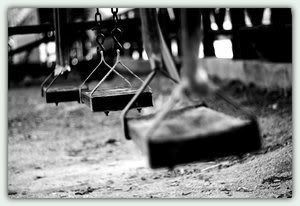
image courtesy of photobucket.com
I’m pretty free during my lunch hour at work, which is usually spent running errands or roaming the majestic aisles of wood and tools at the local Lowe’s. But sometimes my mood calls for something a bit more soul-soothing and I head to the park across town. The park is a nice place. Lots of green and trees and open spaces. Ducks and fish and the back edge of the golf course. It’s quiet there. I’m relatively unbothered too, which is a plus. The squirrels and the occasional jogger are my only company. Also the occasional child.
Yesterday I sat at a picnic table under the shade of an ancient oak and watched a child swing. His mother sat motionless in the swing beside him immersed in a novel, pausing in her reading to utter a half-hearted “That’s great!” and “Don’t go too high.”
It struck me how often I’ve done much the same. Instead of watching my kids live life, I read books on how to do the same thing. Seems odd. Especially since when it comes to living life, my kids seemed to be experts. In fact, as I took in the sight of his little feet kicking in and out and propelling him ever upward, I decided most kids were experts at living. Common wisdom stated that was due to their utter lack of real responsibility and knowledge of the world. I guessed that’s true. But that certainly wasn’t all.
No, I thought, they knew how to live because they knew how to have fun.
I used to swing. I thought about that. Thought about the swing set we had in the backyard and the hours I’d spend on it. There was a simple sense of magic in that act, of being tethered to the earth and yet rising above it. Of leaving and coming home. And there was the sheer joy of going as high as you possibly could and then jumping free, floating in the air where there was nothing and you felt you could go forever only to land in the soft grass and laugh.
I loved swinging. And I missed it.
Of course, things were different now. I was an adult. Responsible. I had a mortgage and bills to pay. A job and a life. And when you had all of those things, you forget about the simple pleasures of childhood. You have to. There comes a time in everyone’s life when the great traffic cop of time walks by and orders you to linger no longer. “Nothing to see here,” he says. “Move along.”
And so I did and we all do.
But I wondered then.
I wondered if there was as much wisdom in the notion of growing down as there was in growing up. I wondered if the world of florescent colors that every child sees really has to gray with time and experience.
I wondered if our joy really had to be lost along with our innocence.
I wasn’t sure. But I knew I had to find out, if only a little.
“Excuse me,” I said to the boy’s mother. “If you’re not going to swing, would you mind trading me seats?”
She put her forefinger into the page of her book and looked up at me, wondering.
“Um,” she said, “okay.”
She took my seat at the picnic table and went back to novel, which from the cover told me it was a love story set in the Dark Ages. I paused to think that maybe that’s where most of us adults were, stuck in our own Dark Age of angst and desperation, searching in vain for something we thought we never had but did all along.
I swung with her boy for about ten minutes. We laughed together and raced. We saw who could dare to go higher and who lean back further.
And when I was done, when the world called back to me, I kicked one last time.
And I jumped.

May 26, 2014
For those who have fought and fallen
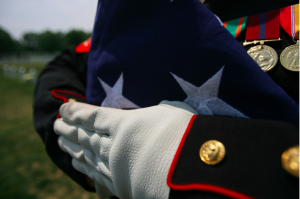
Not too many words on a day like this. There isn’t much I could try to say that would do anything other than diminish the sacrifice of so many. So for today, I’m just going to ask that you watch the video below. And I’ll ask that for just a moment, you bow your head in remembrance of all those brave souls who have fought and fallen on faraway lands so you and I can remain at home in peace.

May 22, 2014
Gettin’ dark
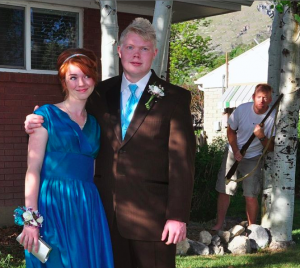
image courtesy of photo bucket.com
I said, “You know Davey, this is why Southerners are stereotyped.”“Don’t know nothin’ about that,” he answered, “just know I gotta clean this. Gettin’ dark, you know.”
I looked at the sunshine splayed over his front yard and still didn’t know what Davey meant by that. So I said, “Just heard a song on the radio that pretty much summed up what you’re trying to do here.”
“Well, if that song was about some guy sittin’ on his porch cleanin’ his shotgun, then I’d say it’s spot on.”
I nodded and said nothing because there wasn’t anything else to say. So I just sat in the rocking chair beside him and watched his grass grow.
In the country a person learns to decipher the hidden meanings found in the common wave. There are many. Depending upon the angle of the arm and the length of the waggle, a gesture by people from their porch can mean anything from “Stop on in and sit a spell” to “If you don’t keep moving, I’m going to shoot you.”
That’s why when I passed Davey Robinson’s house and observed the angle and the waggle of his wave, I stopped. The invite was there, even if the words weren’t.
I climbed onto Davey’s porch and saw the oil and the rags next to his shotgun. Not an uncommon sight in these parts. We take the second amendment with the utmost seriousness. When I asked what he was doing, Davey simply said, “It’s gettin’ dark.”
Davey’s wife poked her head out of the screen door just then. “Hey, Billy,” she said.
“Afternoon Rachel,” I answered.
She looked at her husband. “Davey, this is the last time I’m going to tell you. Put that stuff away.”
“Almost done,” Davey told her.
“Well, hurry up. Caitlyn’s almost ready.”
“What’s Caitlyn up to?” I asked them.
Davey said nothing. Rachel, however, did: “It’s prom night.”
I looked at Davey and smiled. “You’re actually cleaning your gun for Caitlyn’s prom?”
“It’s dirty,” he answered. “I’d be cleanin’ it no matter what Caitlyn’s doin’.”
Uh-huh.
“Honey, please,” Rachel said. “Put that stuff away. If Caitlyn sees you, she’ll go bonkers.”
“Gettin’ dark,” Davey said again.
Rachel rolled her eyes and went back inside, leaving the two of us alone on the porch.
“Caitlyn’s going to prom, huh?” I asked. “Seems like just a few months ago she was still running around here in pigtails.”
“Don’t I know it,” Davey said, running a cloth through the barrel. “I enjoyed every minute of it, too. Guess growin’ up was bound to happen sooner or later, though. This prom thing has been goin’ through her mind for months. Wasn’t much I could do about it.”
“Who’s her date?”
“Guy named Kevin. She’s had him over a few times. Seems like a good enough kid.”
“If he’s a good enough kid,” I said, “then why are you out here sittin’ on the porch with your shotgun? I’m sure they’ll be fine.”
Davey paused with his rag and said, “Fine, huh? Tell me, what sorts of stuff were you thinking about all the time when you were sixteen?”
I thought about that, then said, “Maybe you’d better load that thing.”
“That’s what I thought.”
Caitlyn came onto the porch just then. Her blue dress shimmered in the sunlight, and Rachel had done her hair up into a bun. I understood then why Davey was so nervous. Caitlyn had always been a pretty girl, but right then she looked almost stunning.
“Hi, Billy,” she said.
“Hey, Caitlyn,” I managed.
“How do I look?”
I had to be delicate here. I couldn’t well gush and say too much, not with her father sitting beside me with a shotgun in his lap. But if I said too little, Davey might shoot me anyway.
“You’re easy on the eyes, Miss Caitlyn,” I said. Davey nodded out of the corner of my eyes, and I let out a happy sigh.
“Daddy,” she said, “what in the world are you doin’?”
“Gettin’ dark,” he said.
“I don’t know what that means,” Caitlyn told him, “but please put that thing down before Kevin gets here. For me, Daddy.”
Kevin pulled up in his parents’ car a few minutes later. He was nervous when he saw Davey and me on the porch. He was more nervous when he saw Caitlyn. By the time the two of them had posed for a dozen pictures for Rachel and left, Kevin had nearly sweat through his tux.
Davey and I watched as they pulled away.
“You know,” he said, “I used to come out here on this porch every evening and call that youngin’ in. ‘Gettin’ dark!’ I’d tell her. Now here she is, going out in that dark. And I can’t call her in. Not anymore. She’s gettin’ older. Becoming a woman.”
“Guess so,” I said.
“But I know this,” he said. “She’ll always be my little girl. And I’ll always be waitin’ here on the porch until she comes home.”

May 19, 2014
The boys of summer
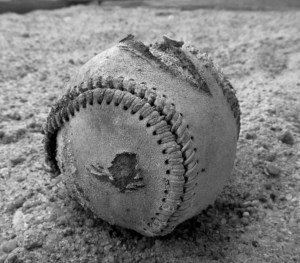
image courtesy of photo bucket.com
In the late springs it was always school and chores after, and when the grass was cut and the garden weeded, there would be time for an inning or two. Then May would give to June. I cannot fully convey just how special that time of year was to me growing up—those few weeks when the air would first warm and then the mountains blossom, and that long string of big, black X’s on the calendar I’d begun in September finally ended. Summer vacation. That’s when the season would really start. That’s when the lot would open.
There were five of us neighborhood kids, and we’d always get together once school was out. There was me and Greg and Chuck and Noel and Jonathan. Sometimes there was a sixth named Duane, but it wasn’t often he was allowed to play. Duane’s daddy was a preacher—not the holy roller kind but something close—and his momma always frowned on us neighborhood kids running around, shooting each other with pretend guns and playing cops and robbers. It was always better when Duane got to play. He was the only one willing to be the cop. It all turned out for the best, though. Duane, he never had much of an arm anyway.
That’s how we measured ourselves back then—by our arms. Not how big they were or how strong, but how far and how fast we could throw a ball. Because let me tell you—back in our old neighborhood, baseball was king and the lot was our castle.
It wasn’t much, that piece of land Maybe half an acre wide and that much long, with a row of big pines marking the left foul line and Mr. Pannill’s house marking the right. The road was our fence.
Come the first day of summer, we were at the lot every morning at 9:00 sharp. We’d play until the sun got too hot. Sometimes Greg’s mom would feed us, and it’d be peanut butter and banana sandwiches in the shade of those pines. Other times, we’d bike it down to the 7-11 and poll what money we had for the biggest Slurpee we could afford. One time Noel said he couldn’t share a straw with all of us, there were too many germs. Don’t you know we let him have it for being such a wuss. Then it’d be back to the lot for more of the same until the sun went down and our mommas started hollering.
The thing about childhood is that you don’t know how special it is until it’s over. All those memories you make will stay in your pocket for the rest of your life, and you’ll take them out from time to time just to handle them and remember. But I think we all understood that back then. I know I did. Even that young and even in the midst of those moment, I knew how special they’d become one day. How long-lasting.
I grew up in that lot. We all played on the Little League teams in town, but whatever we did on the big field didn’t matter. Our reputations—good or bad—were made between the pines and Mr. Pannil’s backyard, and we all knew it. I hit my first home run there, clear to the other side of the road. Broke my first bone in the outfield. I learned about divorce from listening to Noel talk about his parents, and I learned about sex from listening to Jonathan talk about his.
Things like that, they stay with you. They get tucked into your pocket and are never lost.
I learned this at the lot, too—nothing is ever permanent in this world. Even the good things go away eventually. We spent almost nine good summers on that lot and I remember each and every one of them, and I remember how it all began to slowly disappear. Noel moved away. So did Duane, though we never really missed him. The rest of us . . . well, I guess we all just grew up. We got cars and got older. Too old for the lot.
I’ve lost track of most of them now. That happens often in life too, and I think it’s one of the saddest things. There’s now a house where our lot used to be. It’s a nice ranch with a big front porch and flowers planted all the way down the sidewalk, but to me it’ll always be an ugly thing. To me, it will always be the thing that covered over my castle. But I drove down there tonight and just sat. It’s getting on in May and June is right around the corner—just the sort of evening when we’d get together for a few innings. I sat there with the window down and the breeze rustling through those old pines, and I swear I could hear the laughter of five young boys trying to figure out what it meant to be alive. I swear I would hear the ping of the bat. I swear I could hear someone say the next game’s tomorrow.

May 15, 2014
Tribes and tribulations

image courtesy of photobucket.com
I can’t remember the name of the tribe, which is mildly ironic given the nature of their story. And it’s quite a story.It amazes me that regardless of how smart we are and how much we can do, we still know so little about the world.
Only 2 percent of the ocean floor has been explored. Species thought long extinct still turn up every once in a while. And just last year, scientists stumbled upon a valley in New Guinea that had gone untouched by man since the dawn of time. There were plants and insects never seen before. And the animals never bothered hiding or running from the explorers. They didn’t have the experience to tell them humans were a potential threat.
But of course it’s not just plants and animals and hidden valleys that are being discovered. People are, too. And that can lead to all sorts of things.
Take, for instance, the tribe I mentioned above.
They were discovered in 1943 in one of the remotest parts of the Amazon jungle. Contact was carefully arranged. Easy at first, nothing too rash. That seems to be rule number one in those situations–don’t overwhelm the tribe.
It didn’t work. Here’s why.
The difference between these particular people and the others that pop up every few years was that their uniqueness was foundational to their belief system. They’d been so cut off from civilization for so long that they were convinced they were the only humans in the world. No one outside of their small tribe existed. And they liked that idea.
Finding out that not only were there other people in the world, there were billions of them, was too much. The trauma of learning they were not unique was so debilitating that the entire tribe almost died out. Even now, sixty-nine years later, only a few remain.
Sad, isn’t it?
I’ll admit the temptation was there for me to think of that tribe as backward and primitive for thinking such a thing. But then I realized they weren’t. When you get right down to it, their beliefs and the truth they couldn’t carry made them more human than a lot of people I know.
Because we all want to be unique.
We all want to think we’re special, needed by God and man for some purpose that will outlast us. We want to be known and remembered. We all know on a certain level that we will pass this way but once, and so we want whatever time we have in this world to matter.
That’s not a primitive notion. That’s a universal one.
I think at some point we’re all like members of that tribe. We have notions of greatness, of doing at most the impossible and at least the improbable. Of blazing a new trail for others to follow. It’s a fire that burns and propels our lives forward.
I will make a difference, we say. People will know I was here.
But then we have a moment like that tribe had, when we realize there are a lot of other people out there who are more talented and just as hungry. People who seem to catch the breaks we don’t and have the success that eludes us. And that notion that we were different and special fades as we’re pulled into the crowd of humanity and told to take our rightful place among the masses.
It’s tough, hanging on to a dream. Tough having to talk yourself into holding the course rather than turning back. Tough having to summon faith amidst all the doubt.
But I know this:
That tribe was right.
We are all unique.
We are all here for a purpose, and it’s a holy purpose. One that cannot be fulfilled by anyone else and depends upon us.
We are more than flesh and blood. More than DNA and RNA and genes and neurons. And this world is more than air and water and earth. Whether we know it or not, whether we accept it or not, our hearts are a battleground between the two opposing forces of light and dark.
One side claims we are extraordinary. The other claims we’re common.
It’s up to us to decide the victor.

May 13, 2014
Honored with the Ugly

image courtesy of photobucket.com
As far as unwritten rules go, living in the South is much like living in a foreign country. And there are a lot of unwritten rules. Many of them would seem archaic and borderline idiotic to the average outsider, which is one of the many reasons why so many of the small towns that dot the landscape from Virginia to Mississippi would pretty much rather be left alone.
For instance.
It’s imperative that you return a wave. Always. It doesn’t matter if you’re driving through a blizzard and you can’t see out of your windshield and you have two kids screaming in the backseat and you just spilled hot coffee all over yourself. If someone passes you and waves, you’d best wave back.
Same goes for someone holding a door open for you, whether at the grocery store or the bank or the gas station. Again, it doesn’t matter what your mood is or what you’re carrying or what you’re not. Walk through and say thank you. Refuse, and your risks run from the small (being politely put in your place) to the large (being called a liberal).
At no time are these rules more important than when visiting a stranger’s home. Always answer yes when asked if you’d like something to drink, because no visit is a real visit without some sweet tea. Always make sure the mud is off your shoes, even when told it doesn’t matter (because it always matters).
And always, always, sit where you’re told to sit.
That last rule almost tripped me up the other day. I was visiting the home of an uncle of a friend, had checked my boots for mud, and had already been given my glass of tea (in a Mason jar, even!). Things were going just fine. Until we all sat down in the living room, anyway.
“Sit here,” the man said.
He pointed not to the sofa or the love seat, but to the recliner. The faded blue one. With the tear in the seat, the coffee stains on the armrests, and the dog hair everywhere.
Sit? Here?
Yes.
And I almost, almost, politely declined. Put me on the floor or against the wall. Put me anywhere but that chair. But I didn’t. Couldn’t. Proper upbringing can be a real pain sometimes.
So I thanked him for his kindness and sat, slow and gentle, knowing both that one quick movement would get me speared by a protruding spring and my wife was going to kill me for getting so much dog hair on my shirt. The seat screeched and moaned, then finally gave way.
“Not bad, huh?” he asked me.
I took a sip of tea.
“Feels great,” I said.
He smiled and nodded, satisfied.
“Had that chair since I got married. First piece of furniture I ever bought new. My wife says it’s a piece of junk and an eyesore, but not me.”
“I think it looks just fine,” I said.
“Comfortable too, huh?”
“Oh yeah. I’m gettin’ sleepy just sitting here.”
“You know that chair’s been right in that spot for near twenty-five years?” he said. “Never been moved. I like it by the window there. Used to hold my boy in that chair when he was a baby. We’d sit there for hours. He’d lie there on my chest and sleep, and I’d just stare at him trying to figure out how someone like me could have a hand in such a miracle as him.”
I sat my jar on the coffee table and settled into the chair, imagining my chair home where I once sat with my own children. And still did.
“I sat in that chair while I waited for him to come home from his first prom. That was a happy time. Sat there the day he came home drunk because his girlfriend had dumped him. That wasn’t such a happy time. I was sitting there when he found his next one though, and I was in that chair when he said he was going to marry her as soon as he got out of the Marines.”
He grew quiet then, stealing a glance toward my friend who sat on the sofa beside him. He sipped his own tea and then cleared his throat.
“I was sittin’ there when they came to tell me he’d died in some town in Iraq, too.”
The room was silent for a long while. It was a holy silence, one offered not just to the sacrifice of the fallen but to the fragility of life.
“I love that chair,” he finally said.
I did, too. It was the most beautiful chair I’d ever seen.

May 8, 2014
Why write at all?
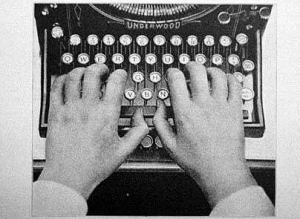 I’m still hoping that one of these days I’ll learn not to turn on the news. There have been times—long periods in my life—when I’ve done without it to amazing results. The world reduces itself to the most basic elements when you are ignorant of what’s going on beyond your front door. Things don’t seem that bad.
I’m still hoping that one of these days I’ll learn not to turn on the news. There have been times—long periods in my life—when I’ve done without it to amazing results. The world reduces itself to the most basic elements when you are ignorant of what’s going on beyond your front door. Things don’t seem that bad.
But then I always go back eventually, checking the internet or the cable news once in the morning and then again in the evening. I tell myself there are too many ignorant people in the world to count myself among them, even if that ignorance really does contain a large portion of bliss. As an adult, I have a responsibility to know what’s going on. It’s a duty.
I’m sort of between the two right now. I know some of what’s going on out there, but not a lot. That’s how it is in the middle of writing a book. Getting those pages in every day takes precedent over much of anything else. I don’t have time to tune in, and so I tune out. I figure the world can carry on without me for this little while.
I finished up a little early the other day, though, and decided maybe I’d just take a few minutes to hope on a few websites. Not long, just a few minutes. Sort of like stepping outside to lick your finger and stick it in the air to see which way the wind was blowing. In the span of those few minutes, I learned that 200 girls had been kidnapped in Africa and threatened with being sold into sexual slavery. I learned that a young woman had won an award for filming her own abortion. I learned that climate change is now climate disruption and we’re all going to either drown or die of thirst, and if you happen to disagree with that notion you’re a Neanderthal. And then I shut my computer before I could learn anything else.
I sat there for a little bit, looking out the window on our little neighborhood. The window was open, letting in a bright sun and a breeze that smelled of blooming flowers and cut grass. A guy down the street was throwing a ball to his dog. Two kids next door were shooting hoops in the road. The retired couple who just moved in across the way were planting some rose bushes. It was a scene likely played out in thousands of neighborhoods in America right then, maybe yours, too, but its commonness in no way tarnished the beauty of it in my mind. That little scene I looked down upon, that was life. That was people trying to get by, trying to enjoy things despite it all.
The wind kicked up just for a moment, just enough to sneak through the big oak outside the window and ruffle the papers I’d just written on. They curled in on themselves and then went tumbling into a pile on the floor. I gathered them up and sat there on the carpet, trying to order the pages from memory, and a funny question crossed my mind:
Why are you doing this?
It took me a minute to figure out exactly what “this” was. I thought at first I was asking myself why I was sitting down on the floor with a stack of papers in my hand, but that didn’t sound right. Too obvious. And then I thought maybe the question was more about why I was sitting upstairs to begin with, and not outside enjoying the spring day. But that wasn’t it, either. No, it was more fundamental than either of those, something that struck me deep down where I most live.
The question was why I write at all.
The question was why bother.
Why spend so much time and suffer through so much stress to write books in a country where most people would rather turn on a television than read a chapter? Why go through the endless heartbreak of being a single shouting voice among the tens of thousands of other shouting voices? Why believe that in some small but significant way, what I do can pause a fallen world from its steady pace toward the edge of some great abyss?
Why bother?
And you know what? I’ll have to think about that and get back with you. Because right now, this moment, I really don’t know.

May 6, 2014
The Grace of a Normal Day
 It’s 5:30 in the morning. Or, as a friend more poetically puts it, “Oh-dark-thirty.” The alarm has just gone off. It’s one of those programmed to offer the most irritating, high-pitched buzz possible. My first thought it to turn the stupid thing off before it wakes everyone else. My second is that I need to find something—anything—that will wake me a little more calmly. Getting jolted straight from sleep to awake can’t be good for you. It just can’t be.
It’s 5:30 in the morning. Or, as a friend more poetically puts it, “Oh-dark-thirty.” The alarm has just gone off. It’s one of those programmed to offer the most irritating, high-pitched buzz possible. My first thought it to turn the stupid thing off before it wakes everyone else. My second is that I need to find something—anything—that will wake me a little more calmly. Getting jolted straight from sleep to awake can’t be good for you. It just can’t be.
The clock is slapped and hit and thrown until the noise stops, and I settle back into bed to take stock. I’m awake. Awake is good. All of my body parts seem functional with a minimal amount of soreness. Also good.
I already know what the day ahead will bring. I know where I’m going and what I’m doing. I know who I’m going to see and in many cases what exactly they will say to me.
Sure, anything can happen. There are always tiny variations; nothing in life is ever truly fixed. I may choose to alter my schedule a bit and therefore miss someone whose path I usually cross. Or, of course, my schedule may be altered by something other than choice. You never know, as they say. But the truth of it is that we actually do in most cases.
For many of us, life immersed in routine. We get up at the same time and go through the same ceremonial acts of preparing for the day, just as we tend to reverse them to prepare for the end of it. The in between, that time spent out in a chaotic world swimming in chance, is really just as predictable. Sure, bad things happen. But not often. That’s why they always end up on the news.
Maybe I’m wrong. Maybe your life is the opposite of mine, full of adventure and derring-do. Maybe there isn’t an alarm clock by your bed because you don’t need one. You wake up on your own and fling your covers back, eager to tackle anything—everything!—if for no other reason than because it’s new and unexpected.
Aside from the occasional Saturday, doesn’t happen to me. My life is a long run-on sentence that is only occasionally interrupted by a comma or a dash. And while I hope there’s an exclamation point at the end, I’ll settle for a period.
I say all this not for your pity, because that’s not what I want. I live the quintessential normal life, and most of the time I’m proud of that fact. I say it instead for those few times when I’m not.
Growing up, the sort of life I wanted was one where I would wake up excited to be alive. My mouth would already be salivating over the endless possibilities before me. The world back then wasn’t something to endure, it was something to conquer. And life seemed to stretch out before me rather than close in around me.
We always have big plans for ourselves when we’re young. We’re just cocky and sure enough to think we know what’s going on and what the world is really about.
That doesn’t last long, of course. Things change. Not just our dreams. Not just our perceptions of life, either. Our perceptions of other things change as well. About three years ago I woke up just like I did a few minutes ago—5:30 a.m. on the button. And I beat the alarm clock into submission and took stock of both myself and my life (also just like a few minutes ago), and my perception was this:
I was in hell.
Which meant my perception of hell had changed as well. I always thought hell would be colored with a fiery red. Turned out it was a dull gray instead.
I was lost back then. I had blessings I was blind to and a future that called but couldn’t be heard. That’s what happens when you allow yourself to go numb. You miss the bad, yes. But you miss the good, too.
I’m better now, which is good. But I know that being unhappy with the much that God has blessed you with is a human condition, and if I am one thing, it is most assuredly human.
So as I’m lying here in bed, I’m reminding myself that it’s easy to forget that the ordinary is just the extraordinary that’s happened over and over again.
Sometimes the beauty of your life is apparent. Sometimes you have to go looking for it. And just because you have to look for it doesn’t mean it’s not there.
My exhale is the here-we-go-again sort, but with a smile. And before I throw back the covers, I offer this small prayer:
God, grant me the grace of a normal day.

May 1, 2014
What kind of __________ should you be?
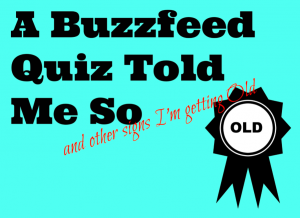 Though I am by no means a social media maven, I do check in with Facebook from time to time, mostly to do what I’m sure what everyone else does—poke into other people’s lives.
Though I am by no means a social media maven, I do check in with Facebook from time to time, mostly to do what I’m sure what everyone else does—poke into other people’s lives.
If you haven’t been around there lately, all everyone seems to be doing is are quizzes. What Superhero Should You Be? What Decade Should You Live In? That sort of thing. Brainless stuff, really. Designed to provide a bit of unproductive escape from the real world. Kind of like Facebook itself.
I ignored them all. If there is anything in this world I don’t have time for, it’s a quiz. Especially a quiz specifically designed to occupy my bored mind in the middle of an afternoon when I should otherwise be getting something done. But then I found myself smack in the middle of today—afternoon, gray, cloudy, rainy, chilly. Everything I needed in order to feel like I really shouldn’t be doing anything at all. You know how it goes.
So I took a quiz.
I did. Couldn’t help myself. And when those two minutes were over I took another one, because I couldn’t help myself then, either.
Ended up wasting the whole afternoon and most of this evening, all told. And I would feel a whole lot worse about it if it weren’t for one simple fact—I learned something.
Those quizzes? There is a value to them, and though you might think I’m kidding, I promise you I’m not.
They might have funny names or ridiculous titles. I think that’s what threw me off at first. And a lot of them aim to give you information you really wouldn’t think you needed. Take them all together, though? Different story.
For instance:
Had I not taken those quizzes, I wouldn’t never known which Game of Thrones house I would belong to. House Stark, if you’re wondering. Or which Big Bang Theory character I’d be, which is Leonard.
I wouldn’t know how stereotypically white I am. (Not White, as it turned out.)
Or how old I actually was. (46.)
I wouldn’t know which TV anti-hero I was like (Rust Cohle) or which X-Files character I most resembled (Fox Mulder), or how long I would survive a zombie apocalypse (six months).
I wouldn’t know how stereotypically American I am. (“You’re as American as a scruffy, blue-jean wearing Bruce Springsteen standing in front of Old Glory You are America, and you’ll fight anyone who says otherwise.”)
Okay, I actually could’ve guessed that last one.
But here’s the thing—aside form all the weird questions and dubious titles, I really did learn a few things about myself. I would be a Stark in the fictional land of Westerous, because evidently I structure my life around a deep concept of honor. I’d be Leonard because I’m not so smart that I no longer dream. I’m only slightly older than my birth certificate, which means I’m not the curmudgeonly old man I thought I was. And I would not last long in a world full of zombies, because I evidently would not sufficiently surrender my humanity in order to survive.
And you know what? I count all those things as good.

April 28, 2014
Between despair and hope
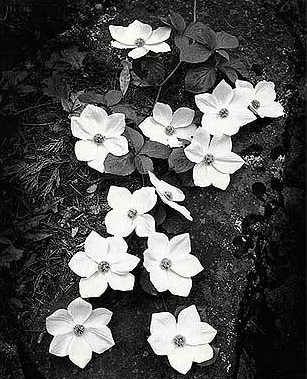
image courtesy of photo bucket.com
It’s been over a week now, but Easter is still on my mind. That’s how it is when you get older. When I was a kid, Easter wasn’t even an entire day, really. It lasted only a couple of hours on those Sunday mornings, beginning with waking up to dive into all that candy stuffed into the basket left for me on the kitchen table and ending just a few hours later, when I walked out of church. When you’re just coming up in the world, Easter seems a little overblown.
After you’ve come up, though? Well, then things get different. You get to that age after you find out the Easter Bunny’s just a poor man’s Santa but before you start sneaking chocolate into your own kids’ baskets, and Easter maybe dims a little more. Maybe it’s the time of year that does it. It’s springtime when Easter rolls around, and everything is new and fresh and drowned in color, and what’s on your mind is more the rising temperature than a rising Lord. You take it for granted that the Miracle happened. The stone got rolled away and the angel said Look inside and inside was empty. You hear things like that too much, sometimes it doesn’t seem so special anymore.
But then something new happens, usually once you get some age and you find that you’re starting to attend more funerals than weddings. Life takes on a different look right about then. The shine starts to wear off. You start thinking less about where you’re at and more about what’s laying on ahead. You maybe discover what Easter means for the first time in your life.
I wouldn’t say that’s where I am personally, but I’d say it’s near enough. To me, Easter is the holiest time of the year. It’s a period to be quiet and listen—days to both despair and hope. That last point is what’s been on my mind.
For a lot of the religiously minded, Easter is really just three days rather than one. It begins on Good Friday, when we pause in our otherwise busy and stressful lives to consider this person who was both God and man, dying such a horrible death, setting himself apart from God so we would never have to ourselves. It ends the following Sunday with that empty tomb full of promise—proof enough for any believer that death has lost its sting.
It’s that Saturday that I want to talk about, though—that Saturday between the first Good Friday and that first Easter. The day between all that despair and all that new hope. Nothing much gets said about that day, and so it’s all left to some imagination and hard thinking. I think about the Marys and the disciples, all shut up inside somewhere, hiding and grieving. I think about them all trying to hold onto a faith that maybe can’t help but be slipping away, searching for any reason at all to believe, and I think about how that seems an awful lot like what most of us feel everyday.
That first Saturday? That’s our lives. Those hours are our years, ones spent trying to hope and understand. Trying to find the reasons behind the horrible things that happen to us all. It’s a tough thing, this business of living, especially when you put a God whose ways are so far apart from our own at the center of it. We stand in the present now just as the disciples stood in it then, and the choice we have is the same as theirs. We can look back to despair, or we can look ahead and hope. It’s a daring hope, no doubt, one that seems near to impossible. And yet that is where we all must turn, and that is what we all must cling to—that stone rolled away. That empty tomb. Because we can do without a great many things in life and still call ourselves living, but we cannot go without hope.




